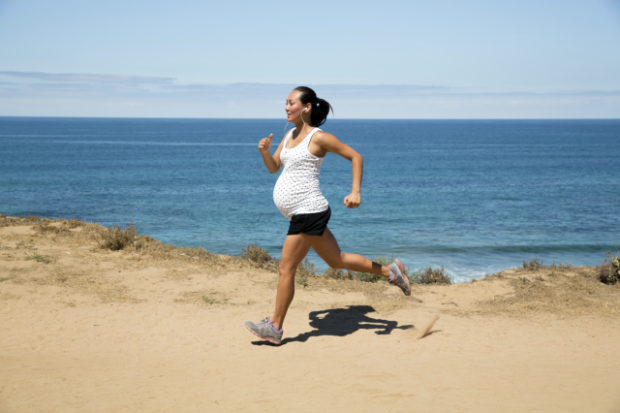
Meeting recommended activity levels during pregnancy can help stave off depression and anxiety, according to new research. Image: Istock.com/AMR Image via AFP Relaxnews
New Canadian research has found that exercising during and after pregnancy could help reduce the risk of depression in new moms and moms-to-be, especially during the current COVID-19 pandemic which can take its toll on mental health.
The findings are the early results from a study by researchers at the University of Alberta who are investigating the impact of COVID-19 on physical activity levels during pregnancy and post-pregnancy.
For the study, 900 women who were pregnant or within the first year after delivery were invited to participate in an online survey between April 14 and May 8, during the current COVID-19 pandemic, and self-report their levels of depression, depressive symptoms, anxiety and physical activity.
The responses showed that during the pandemic, 40.7% of the women had scores on their surveys which indicated depression, compared with just 15% before the pandemic. The surveys also suggested that 72% of the women experienced moderate to high anxiety during the pandemic, compared to 29% pre-pandemic.
However, the good news is that exercise appeared to mitigate the negative effects of the pandemic on the women’s mental health, with those who met or exceeded the recommended 150 minutes of moderate-intensity physical activity each week (as set in the 2019 Canadian Guideline for Physical Activity Throughout Pregnancy) during the pandemic showing significantly lower scores for both anxiety and depression than those who did not.
Perhaps unsurprisingly, the surveys also revealed that it was much harder for the women to keep active during the lockdown put in place because of the pandemic, with 64% of the women reporting that their physical activity levels had dropped in the early days of confinement, while 15% reported that their exercise levels had increased and 21% reported no change to their physical activity.
Margie Davenport, a pregnancy and exercise researcher who led the study, also notes that not only do the findings suggest that physical activity may be linked with better mental health during the pandemic, but previous studies have shown that exercise can reduce depression and depressive symptoms in pregnancy during non-pandemic times as well.
She also added that even in non-pandemic times, pregnant and postpartum women can struggle to find the time or support needed to allow them to exercise.
“These psychological benefits are at risk when physical activity is decreased,” she said. “Knowing to what extent the pandemic is impacting this population’s ability to remain physically active and the subsequent impact on mental health will help us to better understand what we can do to help.”
“Whether they’re hospitalized due to pregnancy complications, or not leaving the house because of a colicky baby, or don’t have the support of family or friends, many women can feel isolated and experience a decline in mental health,” said Davenport. “We hope that further research will help us create resources and supports for pregnant and postpartum women who experience these situations.” RGA
RELATED STORIES
Premature baby girl recovers from COVID-19
Mothers who drink while pregnant could increase child’s risk of depression